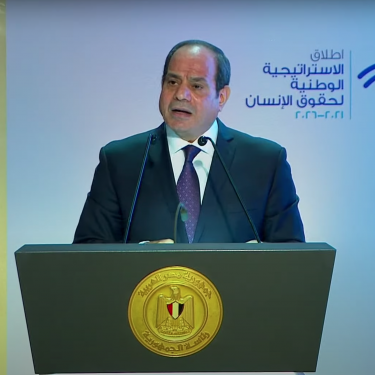RSF hopes Egypt’s national plan for human rights is not a “joke in bad taste”

Responding to Egyptian President Abdel Fattah El-Sisi’s announcement of a five-year plan for improving respect for human rights, Reporters Without Borders (RSF) says Sisi should release the 28 journalists currently detained arbitrarily in Egypt if he wants to show that his government is sincere in its desire to improve the situation.
President Sisi’s speech last weekend proclaiming a “National Strategy for Human Rights” for the five years from 2021 to 2026 was splashed across the front pages of the Egyptian press. Its declared aim, according to a presidential press release, is to “enhance and respect all civil, political, social, economic and cultural rights.”
If one is to believe the official version, it was a newly transformed president, one brimming with good resolutions, who addressed the nation on 11 September, suddenly convinced that there is “a close link between democracy and human rights.”
Sisi said Egypt now undertakes to “respect and protect the right to physical integrity, personal freedom, political practice, freedom of expression and formation of civil associations, as well as the right to litigation.” And as part of the strategy, civil society organisations will be invited to “show interest in enriching the Egyptian political experience,” he pledged.
But it took only 48 hours for facts on the ground to start casting doubt on Sisi’s promises. The family and lawyer of Alaa Abdel Fattah, a blogger held since September 2019 pending trial on charges of membership of a terrorist group, spreading false information, and abusing social media, reported on 13 September that a court had just extended his detention yet again, although his mental state is now very worrying.
His is not an isolated case. At least 27 other journalists are currently imprisoned and, like Fattah, the overwhelming majority have been held for long periods and are awaiting trial. When some are released, such as Solafa Magdy in April and Esraa Abdel Fattah in July, others soon replace them. The latest to be jailed were Abdel Nasser Salama in July and Rabie El-Sheikh in August.
“We would welcome the Egyptian government’s adoption of a long-term vision for improving human rights if we didn’t have grounds for a certain scepticism,” RSF secretary-general Christophe Deloire said. “We hope that this national programme for human rights will be something other than a joke in bad taste, and we invite the Egyptian authorities to lose no time in giving concrete evidence of their commitment by immediately releasing all imprisoned journalists. Where appropriate, we will applaud any constructive initiative.”
Sisi’s claims about press freedom in Egypt have been belied by the reality of his policies in the past. “No one in Egypt can bar anyone working in media or journalism or on TV from expressing their views,” he told CNN in September 2015. But Egypt has become one of the world’s biggest jailers of journalists since Sisi became president.
In May, the UN Working Group on Arbitrary Detention confirmed that all of the ten journalists named in a letter it received last year from RSF were detained arbitrarily. Of the ten journalists listed in RSF’s letter in April 2020, only five have since been released. It was partly for this reason that Field Marshal Sisi’s portrait was included in RSF’s latest gallery of press freedom predators.
Egypt is ranked 166th out of 180 countries in RSF's 2021 World Press Freedom Index.



